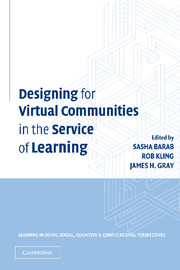Book contents
- Frontmatter
- Contents
- List of Contributors
- Series Foreword
- Foreword
- Preface and Acknowledgments
- In Memoriam
- PART I COMING TO TERMS WITH COMMUNITY
- PART II DESIGNING FOR WEB-SUPPORTED COMMUNITY
- PART III FOSTERING COMMUNITY/MEMBER PARTICIPATION
- 7 The Centrality of Culture and Community to Participant Learning at and with The Math Forum
- 8 An Exploration of Community in a Knowledge Forum Classroom
- 9 Co-Evolution of Technological Design and Pedagogy in an Online Learning Community
- 10 From Ambitious Vision to Partially Satisfying Reality
- PART IV RESEARCHING ONLINE COMMUNITY
- Index
- Titles in the series
- References
10 - From Ambitious Vision to Partially Satisfying Reality
An Evolving Socio-Technical Design Supporting Community and Collaborative Learning in Teacher Education
Published online by Cambridge University Press: 05 June 2012
- Frontmatter
- Contents
- List of Contributors
- Series Foreword
- Foreword
- Preface and Acknowledgments
- In Memoriam
- PART I COMING TO TERMS WITH COMMUNITY
- PART II DESIGNING FOR WEB-SUPPORTED COMMUNITY
- PART III FOSTERING COMMUNITY/MEMBER PARTICIPATION
- 7 The Centrality of Culture and Community to Participant Learning at and with The Math Forum
- 8 An Exploration of Community in a Knowledge Forum Classroom
- 9 Co-Evolution of Technological Design and Pedagogy in an Online Learning Community
- 10 From Ambitious Vision to Partially Satisfying Reality
- PART IV RESEARCHING ONLINE COMMUNITY
- Index
- Titles in the series
- References
Summary
Our chapter relates to an ongoing and continuously evolving research and development project that has as its goal the design of a socio-technical system (a technical environment and related social structures and activities) that will constitute a good model for distributed teacher professional development programs conceptualized as knowledge-building communities. We focus primarily on a part of our work that is situated within the Secondary Teacher Education Program at the University of Wisconsin-Madison. We begin by describing the original ambitious vision for this program that we set out to implement, including its theoretical basis. Then we discuss how both our initial failures and the theoretical framework itself led us to more carefully consider how the historical and institutional contexts of such community-building efforts might influence the social processes of learning and teaching within the community. To illuminate this idea, we present a contextual analysis of the program as a prelude to an interaction analysis of a representative discourse from a group learning activity within the program. Throughout this chapter, we consider lessons learned from studies such as these and from our immersion in the experience of designing a socio-technical environment for supporting community-based teacher education. Drawing on these lessons, we describe our modified goal and the latest results of our efforts to develop an online system for structuring and supporting group learning, including the online mentoring of such learning, within teacher education programs.
- Type
- Chapter
- Information
- Designing for Virtual Communities in the Service of Learning , pp. 256 - 296Publisher: Cambridge University PressPrint publication year: 2004
References
- 9
- Cited by



